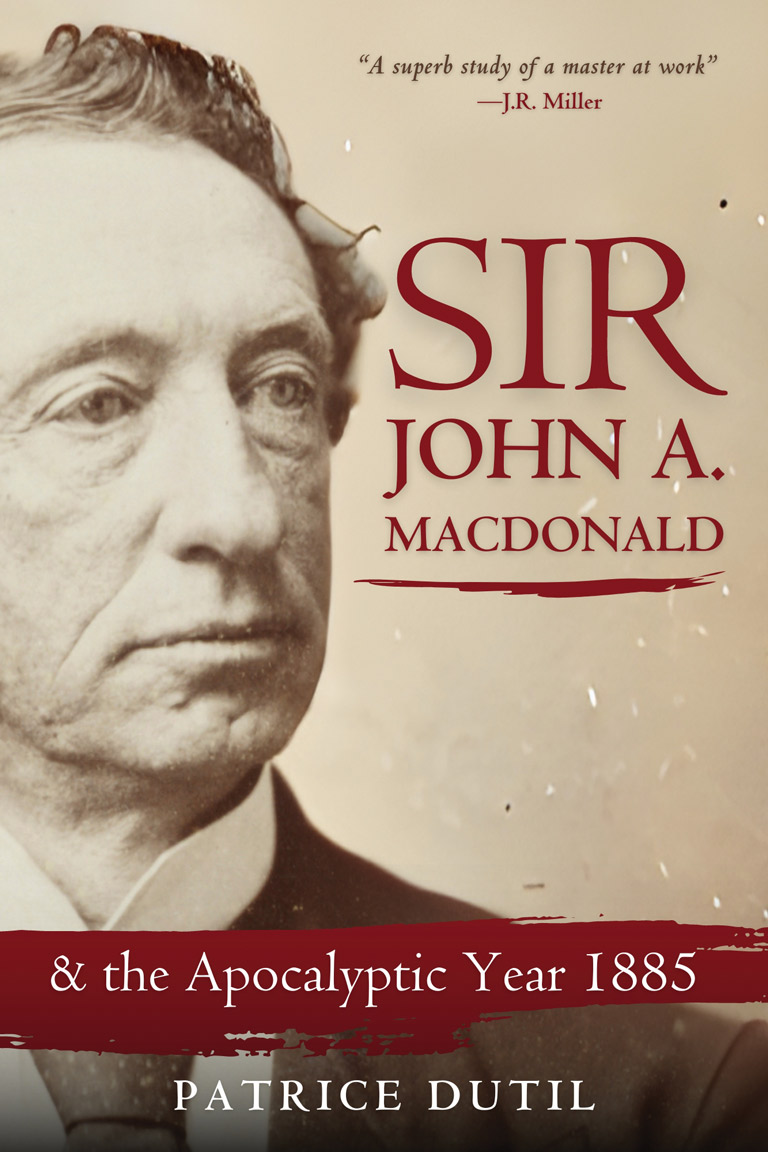Sir John A. Macdonald and the Apocalyptic Year 1885

Sir John A. Macdonald and the Apocalyptic Year 1885
by Patrice Dutil
Sutherland House
327 pages, $37.95
In Sir John A. Macdonald and the Apocalyptic Year 1885, Patrice Dutil has written the first major study of Canada’s founding prime minister in nine years. The last one, Macdonald at 200, an anthology co-edited by Dutil, appeared in 2015 — the same year as the Truth and Reconciliation Commission of Canada’s devastating indictment of the Indian Residential Schools system that was established by the Macdonald government.
Since then the scholarly silence around Macdonald has been deafening — in its place, the sound of vandals defacing his statues, followed by their dismantling. His name has been expunged from schools, institutions, even a parkway in the nation’s capital. Long honoured as the principal creator of Canada, Macdonald has been reduced to a non-person in his own country. This has occurred without any national canvassing of public opinion.
It takes courage to break a silence sanctioned by governments and the media. Dutil, a professor at Toronto Metropolitan University, writes: “It’s hard to imagine a reputation being trashed so hatefully, so suddenly, and so thoroughly…. Students are taught that Macdonald is a person of whom Canadians should be ashamed … a racist, a colonialist, a prototypical Nazi, an architect of Indigenous genocide.”
With 7 uniquely curated newsletters to choose from, we have something for everyone.
Dutil is far from being a residential- schools denier. He states that when the first school opened in 1883, Canada began “a shameful chapter in its history, despite its good intentions. Teaching ‘modern’ skills too often came with attempts to stamp out Indigenous traditions of spirituality, language, and dignity.” His aim is to replace the current simplistic view of Macdonald with the complex truth about the man, his political beliefs and values, and the historical context for his actions. Dutil adopts a method termed “microhistory” — illuminating a broad swath of the past through a deep dive into an especially fateful year or day. He’s chosen 1885, a year that was “apocalyptic” for Canada because it confronted the young nation with unprecedented challenges and threats to its sovereignty. It was a time, he writes, when the biblical Four Horsemen of the Apocalypse swept across the land: the white horse of conquest, the red horse of war, the black horse of famine and pestilence, and the pale horse of death.
It was a year when Canada successfully defended its claim to the Northwest, checkmating American expansion by completing the Canadian Pacific Railway; when Métis under Louis Riel rose against the government for a second time in the Northwest Resistance; when mass starvation among Indigenous peoples on the prairies followed the buffalo’s near extinction; and when smallpox ravaged Indigenous communities and caused an epidemic in Quebec, where five thousand died. Great human suffering attended all these events.
Deploying intensive research into parliamentary debates, correspondence, newspapers, census records, and the historical literature, Dutil narrates Macdonald’s hands-on management of each crisis (he was seventy at the time). His most controversial decisions were dispatching the army to crush the resistance and refusing to commute Riel’s execution after his conviction for treason. But Macdonald had most of the country on his side, apart from elements of French Canada. He restored peace and kept the nation whole, if not united.
Advertisement
He made unprecedented efforts to prevent starvation on the prairies. Contemporary writers have condemned the inadequacy of his emergency food measures for Indigenous people. Yet Dutil states that Macdonald devoted, against fierce opposition in Parliament, as much money to food relief as his government spent on the entire justice system. The aid was never enough, but he did what he could against daunting barriers of geography and politics.
In fact, Dutil argues, Macdonald was “far more progressive than the vast majority of his fellow citizens.” Amid the crises, he championed an advance for democracy: His electoral-franchise bill lowered the property requirement for voting while extending the vote to women and Indigenous men. But the opposition fought against the vote for women, as did members of his own party. Macdonald was forced to amend the bill. Women wouldn’t receive the vote for another thirty-three years, and Indigenous men were enfranchised only in the East (a right later revoked by the Laurier government). Nonetheless, the number of Canadians eligible to vote soared by forty-three per cent.
In his powerful final chapter, Dutil concludes: “Macdonald’s actions need to be measured by the standards of his day. Sadly, that simple bit of common sense has been abandoned by the academics and activists who denigrate Macdonald … and the politicians and public officials who tacitly accept their judgment.” Whether readers agree or not, they will end the book with deeper insight into Macdonald’s Canada and the perilous conflicts he navigated in shaping the new nation.
In today’s environment of misinformation and disinformation, it can be hard to know who to believe. At Canada’s History, we tell the true stories of Canada’s diverse past, sharing voices that may have been excluded previously. We hope you will help us continue to share fascinating stories about Canada’s past, highlighting our nation’s diverse past by telling stories that illuminate the people, places, and events that unite us as Canadians, and by making those stories accessible to everyone through our free online content.
Canada’s History is a registered charity that depends on contributions from readers like you to share inspiring and informative stories with students and citizens of all ages – award-winning stories written by Canada’s top historians, authors, journalists, and history enthusiasts. Any amount helps, or better yet, start a monthly donation today. Your support makes all the difference. Thank you!
Themes associated with this article
Advertisement
Save as much as 40% off the cover price! 4 issues per year as low as $29.95. Available in print and digital. Tariff-exempt!




